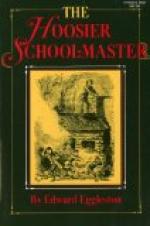Hannah was now brought on the stand. She was greatly agitated, and answered with much reluctance. Lived at Mr. Means’s. Was eighteen years of age in October. Had been bound to Mrs. Means three years ago. Had walked home with Mr. Hartsook that evening, and, happening to look out of the window toward morning, she saw some one cross the pasture. Did not know who it was. Thought it was Mr. Hartsook. Here Mr. Bronson (evidently prompted by a suggestion that came from what Small had overheard when he listened in the barn) asked her if Mr. Hartsook had ever said anything to her about the matter afterward. After some hesitation, Hannah said that he had said that he crossed the pasture. Of his own accord? No, she spoke of it first. Had Mr. Hartsook offered any explanations? No, he hadn’t. Had he ever paid her any attention afterward? No. Ralph declined to cross-question Hannah. To him she never seemed so fair as when telling the truth so sublimely.
Bronson now informed the court that this little trick of having the old soldier happen in, in the flick of time, wouldn’t save the prisoner at the bar from the just punishment which an outraged law visited upon such crimes as his. He regretted that his duty as a public prosecutor caused it to fall to his lot to marshal the evidence that was to blight the prospects and blast the character, and annihilate for ever, so able and promising a young man, but that the law knew no difference between the educated and the uneducated, and that for his part he thought Hartsook a most dangerous foe to the peace of society. The evidence already given fastened suspicion upon him. The prisoner had not yet been able to break its force at all. The prisoner had not even dared to try to explain to a young lady the reason for his being out at night. He would now conclude by giving the last touch to the dark evidence that would sink the once fair name of Ralph Hartsook in a hundred fathoms of infamy. He would ask that Henry Banta be called.




